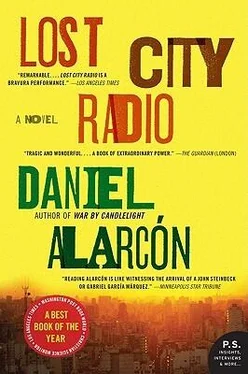“Do you hate them?” his contact had asked early on, and when Rey said he didn’t, the man in the wrinkled suit shook his head. “You read too much poetry, young man. Be certain they hate you.” This was nine years before. Even then the soldiers fired into unarmed crowds. Even then anyone paying attention should have known what was coming. But they had stepped together into this chaos, the insurgency and the government, arm in arm, and for nine violent years, they’d danced.
The war, Rey hoped, would be finished before his son was as tall as a rifle.
He’d met these boys in the camps. Fourteen, fifteen years old. He met them on the same trip when he met his own son. They came from out-of-the-way places plunged in some craggy forested valley or balanced on a rocky promontory or stranded on a barren patch of desert. Places like 1797. They wore hard, expressionless faces, and were not concerned with what bullets could and could not accomplish. They did not expect to die. They all hoped to see the city one day. They told stories about it, spoke of marching down the wide avenues in formation, of being received as liberators. It was what the commanders had told them to expect. When? they asked. Soon. Next month. Next year. When military equilibrium is achieved. What does equilibrium mean? We’ll take the capital, the commanders said, and the boys repeated it to Rey, and he could tell they believed it. Meanwhile, they practiced making bombs in the jungle. None had even the cloudiest sense of what the war was about, and none had ever asked. They were happy to be out of their homes. Once a month, they marched into some town to kill a priest or burn a flag fluttering above a police outpost. They ambushed a military convoy on a bridge and shot at boys their own age, boys who came from towns much like theirs. They were paid in cash on good months, but in a pinch, they accepted promissory notes to be redeemed when victory was achieved. And so Rey, the man from the city, heard one question most of all from these eminently practical young men. “Sir,” they said. “We are winning, aren’t we?”
At first, he didn’t understand. Then it was clear they had money on their minds. “Of course,” Rey reassured them. “Of course we’re winning.”
In the city, it was impossible to speak of the war in those terms. Rey thought of it now as a race to stay alive. If he could survive until the weapons were laid down, if he could live to see that day, then his mistakes could be atoned for. When he saw Norma each night, and saw that she loved him, he despaired. He was most afraid of being alone.
There were quiet months when the war went on without him. Rey left on his single trip to the jungle and returned. He met his boy and dreamed of him and sulked guiltily around the apartment. He made love to his wife and bragged of his child to strange women. He was warned to put it all behind him, and this, finally, was what he intended to do when he met with his contact ten months after Yerevan had disappeared.
It had become a year-end tradition in the press to speculate about peace talks. It was all over the radio and the newspapers. Of course, it was impossible: the IL had no visible leaders, so who would represent them? No one expected it to happen, but they spoke of it because it made them feel better. It was no different when Rey and his contact met at a bus stop in The Settlement that December, near the hills that rose to the southeast of the capital. Rey was never afraid to meet his contact: the city was infinite, designed for hiding in plain sight. They walked to a dingy little bar that was really a poor family’s living room. Christmas lights were strung along the ceiling, intermittently casting splotches of faint red and green light. They sat at a wobbly wooden table and drank instant coffee. The owner stood behind his counter, listening to the radio and thumbing through an old newspaper. Beyond the bar, from the dimly lit room that comprised the rest of the house, Rey could hear a baby crying. He was anxious to say it: I’m out, I’m done, it’s finished, let the war go on without me. It was what he needed to say, but it stuck in his throat. The air was smoky, and then Rey’s contact announced he was going underground. It came as a shock. “And you should too,” he said. “From now until the end.”
“The end?”
Rey’s contact smiled wanly. “All good things must come to a close eventually.”
THE GOVERNMENT had not survived nearly a decade of rebellion without learning a few things about defending itself. Mainly, it had learned how and when and on whom to inflict great pain. Everyone talked eventually. Suspects were brought to the Moon every night and submitted to savage and primitive police work: if they were too strong, or if they had nothing to tell (it was still difficult to know the difference), they were flown by helicopter to the sea and tossed, flailing, into the murky waters below. Others were placed in the same tombs Rey had survived. Some of these suspects were released, and many others were buried in the dusty hills. By current standards, Rey’s stay had been luxurious.
In addition, and perhaps more important, eyes and ears had been recruited throughout the country — no easy task in a nation as large and ungovernable as this one. In the city, an army of street persons was paid to sift through the domestic trash of various suspicious men and women. This work had yielded a surprising number of arrests. Neighbors were encouraged to turn each other in, with cash rewards distributed discreetly to those who supplied useful information. Outside the city, progress was being made as well. In nearly every regional capital, and even in some remote villages, people were in place; people who, for a relatively small sum, could keep an eye on the strangers who passed through. They traded in gossip and insinuation, but were occasionally quite useful.
In 1797, this man was Zahir. He was typical of these ersatz agents: not naturally suspicious, or particularly inclined to support the government, and as far as the war was concerned, relatively indifferent to its outcome. Like many, he probably believed it would never end, with or without his minor involvement. He was, however, a conscientious father and husband, and therefore happy to accept the small but consistent monies offered, for the good of his family. His simple mandate was to keep an eye on things, and this was something he would have done anyway: as one of only a handful of fighting-age men still left in 1797, Zahir had come to consider himself the man in charge. Unlike the others who had stayed, he was not a drunkard, or dim-witted, and was generally liked by the towns-people. He was a married man with a daughter and a son and a small, unproductive plot of land. Zahir considered his new position — secret though it was — a ratification of his own opinion of himself within the village. Most people in 1797 probably didn’t know Zahir could read.
By the time Rey’s son was born, Zahir was an expert of sorts on the strange men who passed through the village and into the forest. They stopped to rest for a day or two, usually worn out, and by the way they carried themselves, Zahir could tell they were not from the nation’s tropical regions. He took spare notes about their demeanor, wrote down bits of overheard conversation, speculated about the origins of their accents. Their faces betrayed an exhaustion buried deep within, and this was their common trait.
There were few books in 1797 when Zahir was a boy. Once, a traveler passing through left a crime novel with the village as a gift. It caused a sensation. There was an elder who knew how to read, and he took it upon himself to share the novel with the boys. He read it aloud over the course of a month, and Zahir fell in love: there were detectives who wore hats and men who smoked in every scene; there were busty women drinking in out-of-the-way dives, and the odd appearance of a gun waiting to fire. The city it described was full of hoodlums and shiny cars and blind alleys where brave men fought with knives until only one was left standing. Nothing could have been more exciting. Zahir had loved its dark tension, as had all the boys his age, and so the reading of this book became a yearly event until the elder who organized it passed away. The novel itself was lost, or perhaps the village buried the book with him; Zahir couldn’t remember. By then, his schooling had already ended.
Читать дальше












